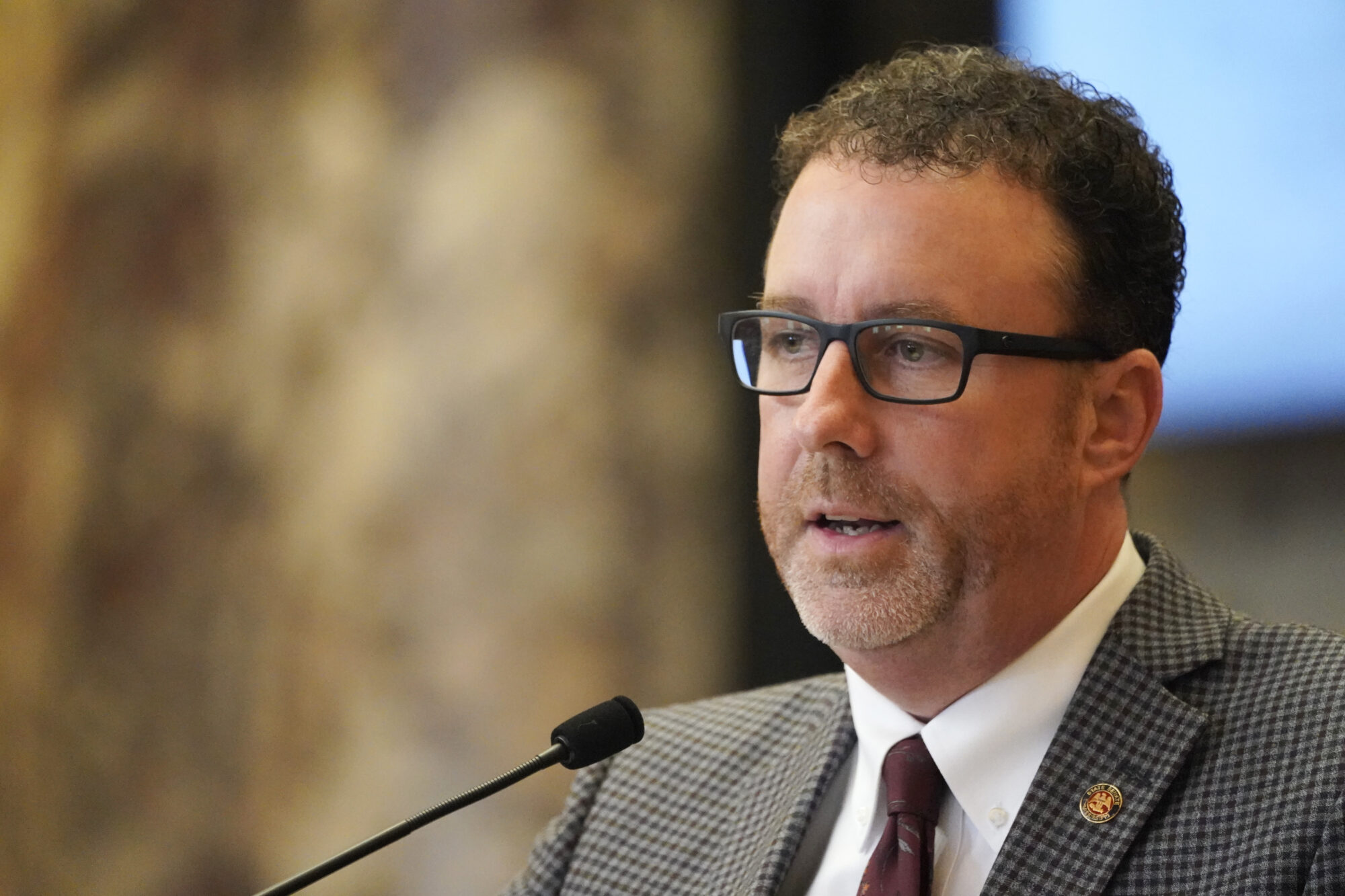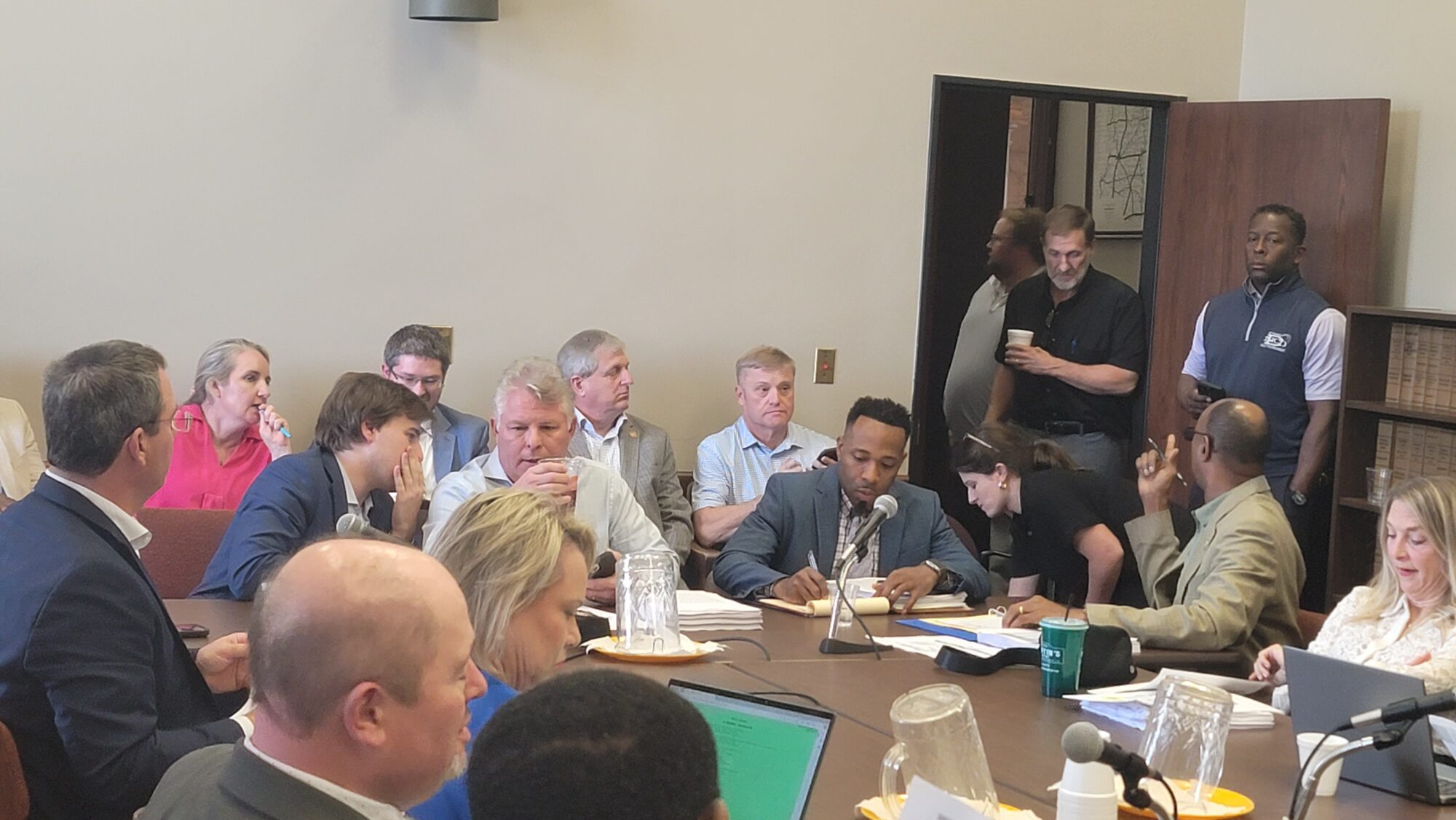
FILE - Mississippi state Sen. David Parker, R-Olive Branch, speaks during a debate at the state Capitol on Feb. 7, 2023, in Jackson, Miss. On Thursday, Jan. 11, 2024, Republican Lt. Gov. Delbert Hosemann named Parker as the new chairman of the Senate Accountability, Efficiency and Transparency Committee, which will give Parker influence over creating a new initiative process for Mississippi. (AP Photo/Rogelio V. Solis, File)
- The legislation halts the PERS Board’s expected 2% employer rate increase, replacing it with a 0.5% increase annually over five years.
Lawmakers passed a suspension resolution this week to allow legislation pertaining to the Public Employees Retirement System (PERS) and education funding to come forward past their deadline.
One intent of the proposed legislation, made public on Friday, is to freeze the pending 2% rate increase for PERS employers that was expected in July. The measure would also adjust the process by which future employer rate increases can be made.
SB 3231 would allow a 0.5% increase in July and each year thereafter until 2028. Any additional recommendation after that from the PERS Board would require at least two independent actuarial assessments along with approval from the Legislature before a rate change could go into effect.
Senators also moved to require the Legislature to consider creating a new Tier within PERS during the 2025 legislative session for future members, or new hires, being added into the system.
Lawmakers were clear that the proposed change would not impact the benefits of current employees or retirees.
The bill was passed on the Senate floor before adjournment on Friday.
PERS Executive Director Ray Higgins told Magnolia Tribune after passage of the bill that the PERS system is stable, but working together with the Legislature must continue in order to keep it that way. He said called the legislation a “short-term” approach to the meet long-term needs.
“To decrease future liabilities and help better sustain PERS, the Board previously recommended a new tier (Tier 5) for future employees, but it is also essential that the System receive adequate funding to meet the long-term needs of the plan,” said Higgins. “PERS is a complex issue with many moving parts. It is important our data and information be used with the full or proper context and understanding. We are available to work with the Legislature throughout the limited remainder of this session and during the year for the betterment of PERS. It is imperative we partner together in this significant endeavor.”
In committee, State Senator David Parker (R), author of the legislation, said conversations with the Appropriations chair and chamber leadership would indicate that an additional cash infusion of roughly $100 million could be in place for PERS in the coming fiscal year.
Upon passage of the bill in the Senate, State Senator David Blount (D) expressed opposition to this method of change, while complimenting some of the efforts to allow the PERS Board to remain as it is, a reference to the previous House plan that would have revamped the Board.
Senator Blount pointed out that lawmakers have been “obsessed” with tax cuts over the last eight years, which has amounted to nearly $1 billion in cuts to state revenues over that time period, with more to come. He insinuated that those cuts have impacted systems like PERS in a negative capacity.
Senator Parker did not agree that tax cuts were to blame for the current state of PERS.
“We have a system that needs money and the sooner we acknowledge that, the better off we will be. The longer we bury our heads in the sand, the worse the problem will get,” said Blount, adding that lawmakers need to consider the PERS unfunded liability as another debt that the state is obligated to pay.
Based on the numbers he has reviewed, Senator Blount said the current proposal will only fund the system at 49.2%, which is moving in the wrong direction.
In committee, State Senator Briggs Hopson (R), chair of the Senate Appropriations Committee, countered that argument saying many of the efforts the Legislature has made during his tenure have been positive for the PERS system. Some of those actions include increasing the employer contribution and going back to the 30-year retirement requirement.
“The PERS situation we are in with unfunded liability is largely related to decisions made long before any of us got here,” said Hopson. “The Legislature has actually done positive things to make sure the system is bolstered.”
Senator Hopson reiterated that the main concern with increasing the employer contribution was putting a financial burden on entities that will force schools, cities and counties, IHL and Community Colleges to dip into their funds for teachers, employees, and programs, or eventually have to lay off people. Local tax increases are also possible.
“I don’t think anyone has an exact answer. The system must be looked at as a whole of government. We can’t look at this through the singular lens of what is going to affect the PERS system; you have to look at it from an overall standpoint of what is healthy for our state,” said Hopson.
State Senator Daniel Sparks (R) reminded members on the floor that in 2022, PERS told lawmakers that in 47 years the system would be 93.5% funded if they continued in the direction they were headed. He ultimately argued that the PERS Board’s decision to lower the rate of return to 7% has lowered the expectation of unfunded liability.
Sparks has maintained that the unfunded liability is based on a number that is created by the PERS Board through the 7 percent expectation, which rang alarm bells for retirees when the 15-year rate of return has been more than 9 percent.
“I am not happy with the people who have lied to the people of my district. I am not happy,” said Senator Sparks. “I am going to defend our word, our honor and our commitment to the state and I don’t care what agency it is, do not lie to my people.”
State Senator Hob Bryan (D) also spoke on the bill, saying most retirement programs have debt and will continue to have debt if the debt is sustainable. Bryan argued that it was through law that the PERS Board was only given authority to assess payroll and increase employer rates to come up with the money necessary to keep the system running.
Senator Bryan pointed to shrinking of government and loss of state jobs as contributors to the loss of revenue for the system, such as jobs like school bus drivers that have been completely removed from the PERS system as they are now outsourced.
The bill now moves to the House for consideration.
How we got here
In the fall of 2023, the PERS Board voted to approve a 5% employer rate increase to be implemented over the next three years at 2% increments for the first two years, and a 1% increase the last year.
The decision by the PERS Board took heavy criticism from lawmakers, local officials, and schools who questioned how they would absorb the new costs. It was estimated that every 2% increase would account for roughly $300,000 in a budget.
The legislation offered by the House, previously killed in Senate committee, originally restructured the PERS Board to 11 members, predominantly appointed by the Governor and Lt. Governor, where they are currently being elected by different categories of PERS retirees and employees.
The same suspension resolution also revived a funding formula for the Mississippi Department of Education within the current Mississippi Adequate Education Program (MAEP) funding formula. More on that effort will be made known soon as lawmakers wind down the 2024 session.










